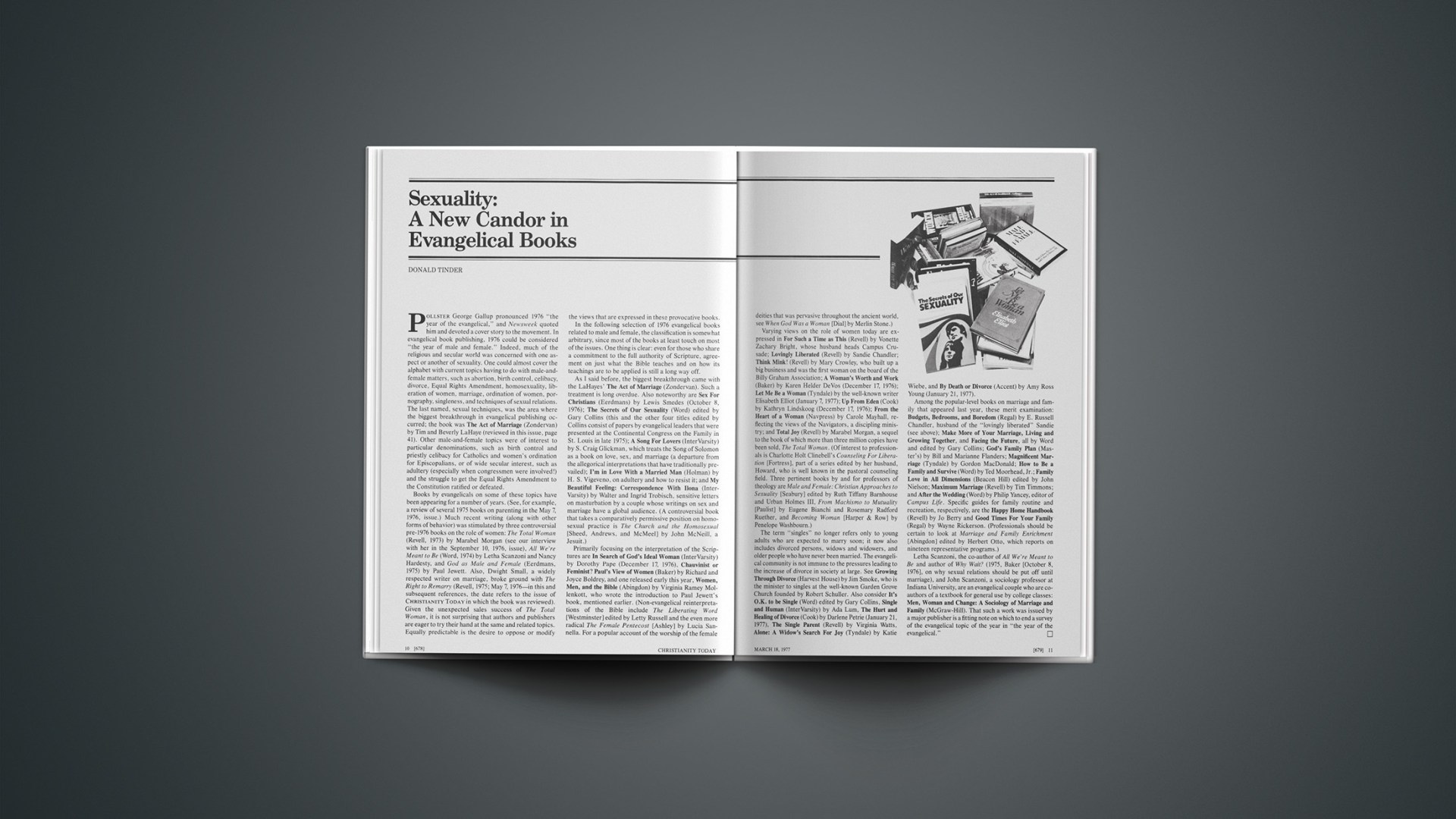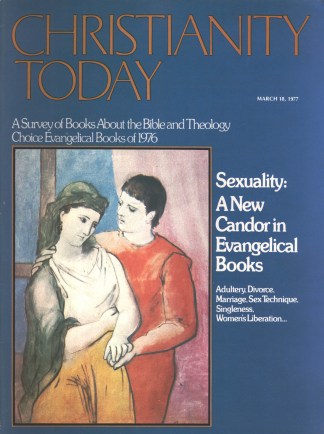Pollster George Gallup pronounced 1976 “the year of the evangelical,” and Newsweek quoted him and devoted a cover story to the movement. In evangelical book publishing, 1976 could be considered “the year of male and female.” Indeed, much of the religious and secular world was concerned with one aspect or another of sexuality. One could almost cover the alphabet with current topics having to do with male-and-female matters, such as abortion, birth control, celibacy, divorce, Equal Rights Amendment, homosexuality, liberation of women, marriage, ordination of women, pornography, singleness, and techniques of sexual relations. The last named, sexual techniques, was the area where the biggest breakthrough in evangelical publishing occurred; the book was The Act of Marriage (Zondervan) by Tim and Beverly LaHaye (reviewed in this issue, page 41). Other male-and-female topics were of interest to particular denominations, such as birth control and priestly celibacy for Catholics and women’s ordination for Episcopalians, or of wide secular interest, such as adultery (especially when congressmen were involved!) and the struggle to get the Equal Rights Amendment to the Constitution ratified or defeated.
Books by evangelicals on some of these topics have been appearing for a number of years. (See, for example, a review of several 1975 books on parenting in the May 7, 1976, issue.) Much recent writing (along with other forms of behavior) was stimulated by three controversial pre-1976 books on the role of women: The Total Woman (Revell, 1973) by Marabel Morgan (see our interview with her in the September 10, 1976, issue), All We’re Meant to Be (Word, 1974) by Letha Scanzoni and Nancy Hardesty, and God as Male and Female (Eerdmans, 1975) by Paul Jewett. Also, Dwight Small, a widely respected writer on marriage, broke ground with The Right to Remarry (Revell, 1975; May 7, 1976—in this and subsequent references, the date refers to the issue of CHRISTIANITY TODAY in which the book was reviewed). Given the unexpected sales success of The Total Woman, it is not surprising that authors and publishers are eager to try their hand at the same and related topics. Equally predictable is the desire to oppose or modify the views that are expressed in these provocative books.
In the following selection of 1976 evangelical books related to male and female, the classification is somewhat arbitrary, since most of the books at least touch on most of the issues. One thing is clear: even for those who share a commitment to the full authority of Scripture, agreement on just what the Bible teaches and on how its teachings are to be applied is still a long way off.
As I said before, the biggest breakthrough came with the LaHayes’ The Act of Marriage (Zondervan). Such a treatment is long overdue. Also noteworthy are Sex For Christians (Eerdmans) by Lewis Smedes (October 8, 1976); The Secrets of Our Sexuality (Word) edited by Gary Collins (this and the other four titles edited by Collins consist of papers by evangelical leaders that were presented at the Continental Congress on the Family in St. Louis in late 1975); A Song For Lovers (InterVarsity) by S. Craig Glickman, which treats the Song of Solomon as a book on love, sex, and marriage (a departure from the allegorical interpretations that have traditionally prevailed); I’m in Love With a Married Man (Holman) by H. S. Vigeveno, on adultery and how to resist it; and My Beautiful Feeling: Correspondence With Ilona (InterVarsity) by Walter and Ingrid Trobisch, sensitive letters on masturbation by a couple whose writings on sex and marriage have a global audience. (A controversial book that takes a comparatively permissive position on homosexual practice is The Church and the Homosexual [Sheed, Andrews, and McMeel] by John McNeill, a Jesuit.)
Primarily focusing on the interpretation of the Scriptures are In Search of God’s Ideal Woman (InterVarsity) by Dorothy Pape (December 17, 1976), Chauvinist or Feminist? Paul’s View of Women (Baker) by Richard and Joyce Boldrey, and one released early this year, Women, Men, and the Bible (Abingdon) by Virginia Ramey Mollenkott, who wrote the introduction to Paul Jewett’s book, mentioned earlier. (Non-evangelical reinterpretations of the Bible include The Liberating Word [Westminster] edited by Letty Russell and the even more radical The Female Pentecost [Ashley] by Lucia Sannella. For a popular account of the worship of the female deities that was pervasive throughout the ancient world, see When God Was a Woman [Dial] by Merlin Stone.)
Varying views on the role of women today are expressed in For Such a Time as This (Revell) by Vonette Zachary Bright, whose husband heads Campus Crusade; Lovingly Liberated (Revell) by Sandie Chandler; Think Mink! (Revell) by Mary Crowley, who built up a big business and was the first woman on the board of the Billy Graham Association; A Woman’s Worth and Work (Baker) by Karen Helder DeVos (December 17, 1976); Let Me Be a Woman (Tyndale) by the well-known writer Elisabeth Elliot (January 7, 1977); Up From Eden (Cook) by Kathryn Lindskoog (December 17, 1976); From the Heart of a Woman (Navpress) by Carole Mayhall, reflecting the views of the Navigators, a discipling ministry; and Total Joy (Revell) by Marabel Morgan, a sequel to the book of which more than three million copies have been sold, The Total Woman. (Of interest to professionals is Charlotte Holt Clinebell’s Counseling For Liberation [Fortress], part of a series edited by her husband, Howard, who is well known in the pastoral counseling field. Three pertinent books by and for professors of theology are Male and Female: Christian Approaches to Sexuality [Seabury] edited by Ruth Tiffany Barnhouse and Urban Holmes III, From Machismo to Mutuality [Paulist] by Eugene Bianchi and Rosemary Radford Ruether, and Becoming Woman [Harper & Row] by Penelope Washbourn.)
The term “singles” no longer refers only to young adults who are expected to marry soon; it now also includes divorced persons, widows and widowers, and older people who have never been married. The evangelical community is not immune to the pressures leading to the increase of divorce in society at large. See Growing Through Divorce (Harvest House) by Jim Smoke, who is the minister to singles at the well-known Garden Grove Church founded by Robert Schuller. Also consider It’s O.K. to be Single (Word) edited by Gary Collins, Single and Human (InterVarsity) by Ada Lum, The Hurt and Healing of Divorce (Cook) by Darlene Petrie (January 21, 1977), The Single Parent (Revell) by Virginia Watts, Alone: A Widow’s Search For Joy (Tyndale) by Katie Wiebe, and By Death or Divorce (Accent) by Amy Ross Young (January 21, 1977).
Among the popular-level books on marriage and family that appeared last year, these merit examination: Budgets, Bedrooms, and Boredom (Regal) by E. Russell Chandler, husband of the “lovingly liberated” Sandie (see above); Make More of Your Marriage, Living and Growing Together, and Facing the Future, all by Word and edited by Gary Collins; God’s Family Plan (Master’s) by Bill and Marianne Flanders; Magnificent Marriage (Tyndale) by Gordon MacDonald; How to Be a Family and Survive (Word) by Ted Moorhead, Jr.; Family Love in All Dimensions (Beacon Hill) edited by John Nielson; Maximum Marriage (Revell) by Tim Timmons; and After the Wedding (Word) by Philip Yancey, editor of Campus Life. Specific guides for family routine and recreation, respectively, are the Happy Home Handbook (Revell) by Jo Berry and Good Times For Your Family (Regal) by Wayne Rickerson. (Professionals should be certain to look at Marriage and Family Enrichment [Abingdon] edited by Herbert Otto, which reports on nineteen representative programs.)
Letha Scanzoni, the co-author of All We’re Meant to Be and author of Why Wait? (1975, Baker [October 8, 1976], on why sexual relations should be put off until marriage), and John Scanzoni, a sociology professor at Indiana University, are an evangelical couple who are coauthors of a textbook for general use by college classes: Men, Woman and Change: A Sociology of Marriage and Family (McGraw-Hill). That such a work was issued by a major publisher is a fitting note on which to end a survey of the evangelical topic of the year in “the year of the evangelical.”










